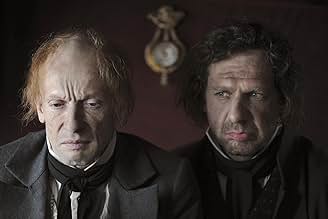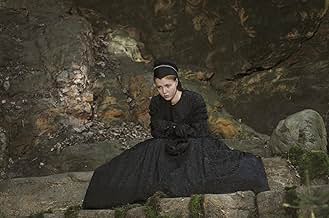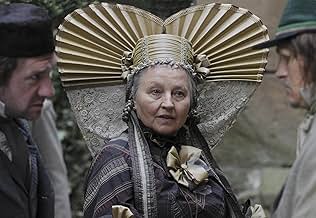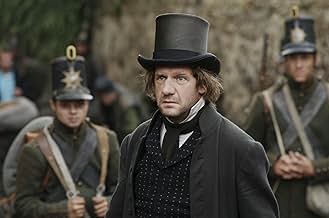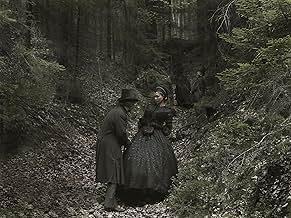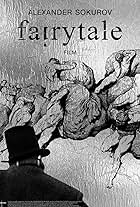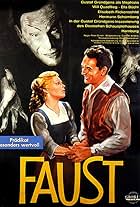IMDb RATING
6.5/10
5.9K
YOUR RATING
A despairing scholar sells his soul to Satan in exchange for one night with a beautiful young woman.A despairing scholar sells his soul to Satan in exchange for one night with a beautiful young woman.A despairing scholar sells his soul to Satan in exchange for one night with a beautiful young woman.
- Awards
- 15 wins & 27 nominations total
Eva-Maria Kurz
- Faust's Cook
- (as Eva Kurz)
Featured reviews
it is not the best Faust adaptation. the form is different, the Sokurov ambition to create his story is obvious, the images are pieces from same material of others movies by him. but it is far to be the worst adaptation. short, the lead character of film is the director. and this character is Mephisto in clothes of Faust. the dark scenes, the atmosphere, the dialogs, the Georgian young man or Isolda Dychauk as Renaissance Madonna/Margareta, the first scene and the last, each is letter of a letter who desire say more than its text. a profound film and not uninspired game with a delicate subject. good performance, interesting presence of Hanna Schygulla, smart manner to translate to present the Goethe drama. but , more than philosophic movie, it is a too complicated labyrinth. the ambition is to impress with entire force. but something missing. maybe, the soul.
a question more than a film. nothing surprising for Sokurov.because not the story is the axis but the atmosphere the air who seems be mud, the dialogues who are cold and bitter, the actors who becomes shadows. a film who propose the world in precise slices. and that is the source of controversies and the heart of a fascinating film about reality and choices. far to be comfortable, it is a challenge. because it propose the aesthetic of ugly things, because firs scene is an open corpse and the pact with devil has different nuances by the classic text of Goethe. but the idea is the same.same, the need of certitude. a film about the taste of knowledge. and the essence of self definition.
Tiglon's DVD release of Faust comes with a booklet featuring essays by two prominent Turkish film critics, offering insights into both the film and its director, Aleksandr Sokurov.
In Russia, many critics hail Sokurov as the new Tarkovsky. As someone who admires both directors, I disagree. They are distinct cinematic voices, and labeling Sokurov as "the new Tarkovsky" feels like a disservice to his unique artistry. Sokurov has his own cinematic language and is a masterful filmmaker in his own right.
Some call him the Dostoevsky of Russian cinema, and considering this film, they might have a point. Whether adapting literary works or crafting original stories, Sokurov's characters often seem to emerge from the depths of Dostoevsky's world.
For me, Faust was a nightmarish book. It was assigned reading at Deutsche Schule Istanbul, and German has always been a language I've kept at arm's length.
Faust's perilous journey, driven by dissatisfaction with his life and a yearning for the unknown, becomes an unsettling experience for the audience. His hunger for knowledge and the unseen, his desire for the unlived, and his obsession with the unpossessed lead him down a path guided by the Devil. We witness a man, consumed by his quest to locate the soul within the body, ultimately lose his own soul. We watch as a man who once murmured, "In the beginning was the word," succumbs to the Devil's influence and declares, "In the beginning was the deed." We see a man who chases the radiant beauty of Margarete, a symbol of life's splendor, only to drag her into darkness and ultimately vanish into the abyss of the unknown. A crucial detail in this journey is that Mephistopheles (the film's equivalent of Mephisto) never forces Faust's hand. He presents the possibilities and leaves the decision to Faust. In this sense, Faust, who sells his soul to the devil for what he could have, becomes perhaps even more frightening than the Devil himself, as he reveals to us the potential for our own damnation.
The opening scene signals that this won't be a sunny cinematic experience. The chaotic, dark, and eerie atmosphere gradually seeps into our consciousness through the sets, costumes, lighting, and colors. The theatrical scenes and challenging dialogues pay homage to the source material until the very last frame.
Throughout the film, the power of a line spoken by Faust early on, "The god who shakes me inside is powerless outside of me," never diminishes but instead intensifies.
In Russia, many critics hail Sokurov as the new Tarkovsky. As someone who admires both directors, I disagree. They are distinct cinematic voices, and labeling Sokurov as "the new Tarkovsky" feels like a disservice to his unique artistry. Sokurov has his own cinematic language and is a masterful filmmaker in his own right.
Some call him the Dostoevsky of Russian cinema, and considering this film, they might have a point. Whether adapting literary works or crafting original stories, Sokurov's characters often seem to emerge from the depths of Dostoevsky's world.
For me, Faust was a nightmarish book. It was assigned reading at Deutsche Schule Istanbul, and German has always been a language I've kept at arm's length.
Faust's perilous journey, driven by dissatisfaction with his life and a yearning for the unknown, becomes an unsettling experience for the audience. His hunger for knowledge and the unseen, his desire for the unlived, and his obsession with the unpossessed lead him down a path guided by the Devil. We witness a man, consumed by his quest to locate the soul within the body, ultimately lose his own soul. We watch as a man who once murmured, "In the beginning was the word," succumbs to the Devil's influence and declares, "In the beginning was the deed." We see a man who chases the radiant beauty of Margarete, a symbol of life's splendor, only to drag her into darkness and ultimately vanish into the abyss of the unknown. A crucial detail in this journey is that Mephistopheles (the film's equivalent of Mephisto) never forces Faust's hand. He presents the possibilities and leaves the decision to Faust. In this sense, Faust, who sells his soul to the devil for what he could have, becomes perhaps even more frightening than the Devil himself, as he reveals to us the potential for our own damnation.
The opening scene signals that this won't be a sunny cinematic experience. The chaotic, dark, and eerie atmosphere gradually seeps into our consciousness through the sets, costumes, lighting, and colors. The theatrical scenes and challenging dialogues pay homage to the source material until the very last frame.
Throughout the film, the power of a line spoken by Faust early on, "The god who shakes me inside is powerless outside of me," never diminishes but instead intensifies.
Best watched late on a sleepless night when you feel at the end of your tether. Like a nightmare that I couldn't wake from, this and a glass of scotch took the edge off my own bewildered existence. It needs several viewings to begin to get to the bottom of whatever it is trying to say about fallen man, but I am sure it is not a message of hope. As a piece of filmmaking I found it hard to fault. It transported me to an unknown, lost world that suggested Dark Ages Germany seen through an alchemist's green bottle spun faster and faster on some infernal machine. I am unlikely to forget this world even if I may be reluctant, for now, to revisit it. On another dark night perhaps.
It begins with the evisceration of a corpse, and that could be a metaphor for the way this alleged adaptation proceeds - except that Goethe's "Faust" is not dead, only given the dead-letter treatment here. The film's emphasis is on gross, clumsy physicality: you never saw so many actors stumble as they walk, bumping into things and one another; too artless and unfunny for slapstick, the universal jostling is prevented from being laughable by funereal pacing and the array of hangdog faces. Since the Faust figure (Johannes Zeiler) conveys very little in the way of intellect, all that elevates him is that most of the other characters have been made open-mouthed gapers, presumable halfwits. Wit is barred out anyway by the color-palette, all various hues of mud - the surest sign of high-serious intentions in movies nowadays. In exterior shots the sky is overexposed so it shows as a gleamless white blur; the earth is dun-colored, greens are gray-tinged, and reds are virtually absent, on their rare appearance tending to brown, like bloodstained linens oxidizing. The cut of the men's clothing updates the story to several decades after Goethe's time: trousers are worn, rather than breeches and hose. The fabrics are thick, heavy, coarse, and of course dark-dyed and fraying badly. No one could think of playing the dandy here. Strangely, there seems to be no Republic of Letters either. The few characters with intellectual interests neither write nor receive letters; they're isolated from enlightenment and worldly affairs: no one awaits the postman; no one looks at a journal of science or politics or the arts - this is a stupefying omission, as false to the historical period as it would be to Goethe's own. Sokurov's flight from historical particulars strands his Faust: the fable and the character become "timeless" in all the wrong ways. Faust doesn't represent his age's high hopes, or its seeds of self-destruction; but then he doesn't represent our age either. Sealed off in its remoteness, Sokurov's "Faust" is just another - all-too-familiar - sulking, glooming art-house reverie.
Storyline
Did you know
- TriviaIt won the Golden Lion award at the 2011 Venice Film Festival. It is the 3rd Russian film to be crowned best film in Venice, after Ivan's Childhood (1962) and The Return (2003).
- ConnectionsFeatured in At the Movies: Venice Film Festival 2011 (2011)
- SoundtracksSalve Regina
(uncredited)
Gregorian chant
- How long is Faust?Powered by Alexa
Details
- Release date
- Country of origin
- Official sites
- Language
- Also known as
- Fausto
- Filming locations
- Production companies
- See more company credits at IMDbPro
Box office
- Budget
- €8,000,000 (estimated)
- Gross US & Canada
- $58,132
- Opening weekend US & Canada
- $10,030
- Nov 17, 2013
- Gross worldwide
- $64,556
- Runtime2 hours 20 minutes
- Sound mix
- Aspect ratio
- 1.37 : 1
Contribute to this page
Suggest an edit or add missing content



